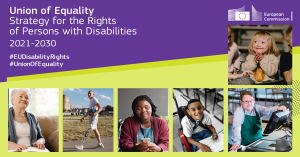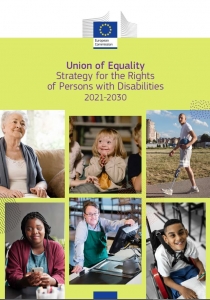A Union of Equality: the Disability Rights Strategy
by Vittoria Valentina Di Gennaro, EfVET
 Ensuring that people with disabilities can exercise their rights, enjoy equal opportunities, participate in society and the economy on an equal basis, decide where and with whom to live, move freely, regardless of their support needs and without being discriminated against.
Ensuring that people with disabilities can exercise their rights, enjoy equal opportunities, participate in society and the economy on an equal basis, decide where and with whom to live, move freely, regardless of their support needs and without being discriminated against.
It is on the basis of these objectives and the resulting challenges that the European Commission has built the new Strategy on the Rights of Persons with Disabilities 2021-2030 published on 3 March 2021, through which it will coordinate the efforts of Member States in implementing the United Nations Convention on the Rights of Persons with Disabilities (UNCRPD) with the aim of improving its effectiveness.
Despite all the efforts already undertaken through the previous 2010-2020 strategy and related initiatives, persons with disabilities continue to face obstacles in accessing health care, education, employment and recreation, as well as in participating in political life. All other things being equal, they are also at greater risk of poverty, social exclusion and discrimination.
The pandemic, and its consequences in economic and employment terms, has further accentuated these problems of inequality, making it more urgent to address them.
In order to enable people with disabilities to participate fully in society on an equal footing, this new strategy sets out a number of initiatives to be taken, which are structured around three themes:
– EU rights, concerning in particular the free movement of people with disabilities within the EU territory as well as their participation in political life. Among the main initiatives identified is the creation of a European disability card valid in all EU countries, which will facilitate the mutual recognition of disability status and related rights between Member States, facilitating the effective exercise of the right to free movement.
– Independent living and autonomy, i.e. the right of everyone, including people with disabilities, to live independently and to choose where and with whom they live. Among the initiatives designed to make this right a reality, the Commission intends to develop guidelines to improve social services for people with disabilities.
– Non-discrimination and equal opportunities, covering the protection of people with disabilities from all forms of discrimination and violence with measures to ensure access to justice, education, culture, sport and tourism, and equal opportunities in all these areas as well as in employment and all health services.
A central theme for the strategy is accessibility. Accessibility to physical and virtual environments, technologies, goods and services, and in particular transport. Accessibility is often an enabling factor for the effective exercise of rights and a prerequisite for concrete equality.
 Thanks to several pieces of legislation such as the European Accessibility Act, the Web Accessibility Directive and the Passenger Rights Act, accessibility for people with disabilities has certainly improved, but many aspects remain to be regulated in order to remove remaining barriers, in particular in the accessibility of buildings, public spaces and some modes of transport. To address these, and to disseminate best practices from around Europe, the Commission in 2022, in the framework of the disability platform, plans to create AccesibleEU, a European resource centre to create a knowledge base of good practices on accessibility.
Thanks to several pieces of legislation such as the European Accessibility Act, the Web Accessibility Directive and the Passenger Rights Act, accessibility for people with disabilities has certainly improved, but many aspects remain to be regulated in order to remove remaining barriers, in particular in the accessibility of buildings, public spaces and some modes of transport. To address these, and to disseminate best practices from around Europe, the Commission in 2022, in the framework of the disability platform, plans to create AccesibleEU, a European resource centre to create a knowledge base of good practices on accessibility.
Among the various initiatives envisaged to help people with disabilities to exercise their rights, to be more autonomous, not to be discriminated against and to participate actively and on an equal footing in active life, the Commission has planned to produce several guides, including one on the participation of people with disabilities in the electoral process (in 2023) and another for Member States on independent living and community inclusion (in 2023). It will also support inclusive democratic participation, including for people with disabilities, through the new Citizenship, Equality, Rights and Values programme and introduce a European quality framework for excellent social services for people with disabilities (in 2024).
The implementation of the Strategy will see the strong involvement of all Member States as key players in the implementation of the UN Convention on the Rights of Persons with Disabilities. By bringing together national authorities responsible for the implementation of the Convention and organisations of people with disabilities, the Commission will also establish the Disability Platform that will contribute to the implementation of the Strategy and to strengthen cooperation and exchanges on the implementation of the Convention.
The Commission will also mainstream disability issues in all major EU policies and initiatives and, in order to support partner countries in their efforts to implement the UN Convention and provide guidance for a disability-inclusive implementation of the MDGs, will promote the rights of people with disabilities globally, on the one hand by using instruments such as technical assistance and financial programmes, and on the other by providing support through EU Delegations, policy dialogue and work in multilateral fora.
The Disability Rights Strategy 2021-2030 contributes to building an Equality Union together with the LGBTIQ Equality Strategy 2020-2025, the EU Action Plan against Racism 2020-2025, the Gender Equality Strategy 2020-2025 and the EU Roma Strategic Framework.
848 total views, 1 views today



